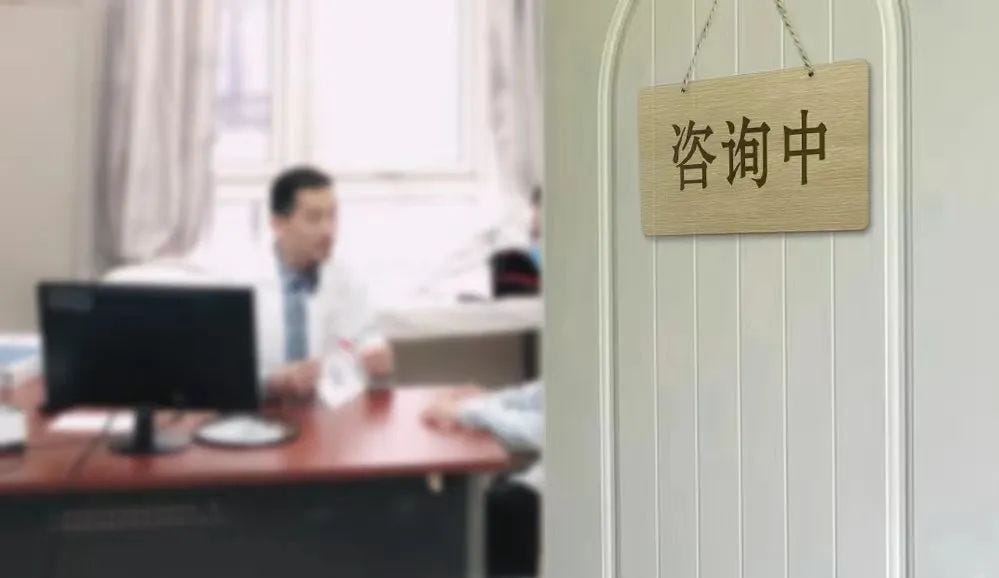Welcome to RealTime Mandarin—a multimedia resource to immerse you in the latest Chinese language trends, inspire you to practice and improve your Mandarin every week, and empower you to communicate with confidence.
Subscribe now to get the next issue straight to your inbox!
This week we listen in on conversations with Pān Bǎilín 潘柏林, a Beijing-based doctor who is the founder of China’s first clinic for transgender people.
He founded the Comprehensive Transgender Clinic at Peking University Third Hospital in 2017 (北京大学第三医院在2017年开设的跨性别综合门诊):
Dr. Pan Bailin is the founder of the first transgender medical team in China. This team draws medical resources from fields including psychological counselling, endocrinology, reproductive medicine, otolaryngology, general surgery, and plastic surgery to provide medical support for transgender people.
潘柏林医生,是国内第一支跨性别序列医疗团队的创建者。这支医疗团队,整合了心理咨询科、内分泌科、生殖医学、耳鼻喉科、普通外科、整形外科等专业领域的医疗资源,为跨性别者提供医疗支持。
I first read about this story in the Ginger River Review, which highlighted long-form piece in an excellent WeChat public account, The Truman Story 真实故事计划 (see link at the end).
In interviews with Doctor Pan, and some of the families he has helped, Pan shares his experiences working with transgender teenagers, and their parents and families.
In the clinic, when parents learn their child is transgender, their first reaction is almost always self-reflection. They look back at possible problems in their parenting, blaming themselves for a few irrelevant details. Some single mothers believe their son becomes feminine because of a lack of fatherly love. Some parents also reflect on their lack of time with their children, or that they beat and scolded them, failing to raise them well. All Pan Bailin can do is to help them understand over and over again that this occurs naturally, that the child is who they are, and it has nothing to do with their parenting. Once they start talking, often an hour or two passes quickly.
在门诊里,得知孩子是跨性别者,几乎所有家长的第一反应都是自我反思,他们回溯抚养过程中可能出现的问题,揪住几个不相关的细节责怪自己。有的单亲妈妈认为,儿子是因为缺少父爱,经常和自己待在一起,才会变得“女性化”。也有的父母反省,自己缺少给孩子的陪伴,又或者打骂了孩子,没把孩子养好。潘柏林只能一遍遍帮助他们们理解,这是一种客观存在的现象,孩子没错,跟父母的抚养也没有关系。一聊起来,往往一两个小时就过去了。
Some important language you need to know about this topic:
Trangender in Chinese is 跨性别 kuà xìng bié, or 跨儿 kuà er.
Transitioning away from masculine towards feminine is 男跨女 nán kuà nǚ, and vice versa
Hormone therapy is 激素治疗 jī sù zhì liáo
So that’s what we explore this week: The emotional journey from confusion, depression and despair of the kids (and their parents), to the happiness of people finding “their true selves” (成为自己), and joining a community of people who support and understand each other.
Favourite Five
1. 娘 niáng
female; effeminate
为了让自己在男孩中更合群,不因为太“娘”而受欺负,花弦在中学时加入了坏学生团体 - In order to fit in and not be bullied for appearing effeminate, Hua Xian joined a group of bad students in middle school.
More: 娘娘腔 niáng niáng qiāng - effeminate, camp
2. TA tā
he, she, they
在家长的许可下,也可以酌情采用激素治疗,让身体转变为TA希望的性别特征 - With the permission of the parents, hormone therapy can also be used as appropriate to give the body the gender characteristics they desire.
Note: The pinyin ‘ta’ is often used as a personal pronoun for all genders.
3. 出柜 chū guì
to come out of the closet
孩子出柜,相当于把父母锁在柜子里 - The child has come out of the closet, but the parents are still well and truly locked in there.
Note: From the English phrase.
4. 支离破碎 zhī lí pò suì
broken, fragmented
我们全家因为这个孩子已经支离破碎了,奶奶被气住院了,家里又没钱 - Our whole family has been torn apart because of this child. The grandma was hospitalised because she was so upset, and the family has no money.
5. 先天与后天 xiān tiān yǔ hòu tiān
nature or nurture
所持有这种心理性别特征是与生俱来的,并不是通过后天学习或者环境影响形成的 - Psychological gender characteristics are innate, which are not formed through learning or shaped by the external environment.
Note: The Chinese version of this common English concept, which directly translates as ‘first day’ or ‘later day’.
Consuming the Conversation
Useful words
6. 蛊惑 gǔ huò
bewitched
有人将这里视为蛊惑、毒害青少年的窝点,以及一群为了挣钱勾结的无良医生 - Some people regard this place as a den for bewitching and poisoning teenagers, where a group of unscrupulous doctors collude together to make money.
7. 瞥见 piē jiàn
glimpse
他常常瞥见孩子们胳膊上留下的刀子划痕 - He would often catch a glimpse of the knife marks left on the arms of children.
Note: Different to 窥见 kuī jiàn which means to peek, pry; whereas 瞥 means glimpse.
8. 扭转 niǔ zhuǎn
to reverse or turn back
他们通常有更强的执念——把孩子“扭转”过来 - They usually have a stronger obsession - to ‘turn’ the child around.
Note: In this context ‘turn around’ is referring to parents who want to reverse their kids’ desire to change gender.
9. 可怖 kě bù
scary
她在惊恐中关掉网页,强行压抑这些可怖念头 - She closed the webpage in panic and tried to force herself to suppress those horrible thoughts.
Note: Similar in meaning but more literary than 可怕 kě pà.
10. 霸凌 bà líng
bullying
她没法再强迫自己,于是,很快从霸凌者变回了被欺凌的对象 - She couldn't force herself anymore, so she quickly changed from the bully back to the one being bullied.
Note: Same in meaning as 欺凌 qī líng; whereas 欺负 qī fu is more colloquial and more general.
11. 药娘 yào niáng
drug girl; someone who takes hormones to change their gender
一位跨性别者曾在接受媒体采访时提到,自己认识的一位药娘,还被带着走上吸毒的道路 - A transgender person once mentioned in an interview with the media that a girl he knew was led to take hormone drugs and became a drug addict.
Note: A derogatory term.
12. 学费 xué fèi
study fee; a cost of learning something
扭转机构每个月收费高达一两万。很多家长需要缴纳三到六个月,甚至一两年的“学费” - The gender reverse agency charges as much as RMB 10,000 to 20,000 per month. Many parents need to pay this ‘tuition fee’ for three to six months, or even one or two years.
Note: Normally relates to a cost which has not ended in success, or has been a costly mistake.
13. 酸楚 suān chǔ
sorrow and grief
唯有在这些经历相似的父母身上,才能理解彼此的酸楚和艰辛 - Only those parents who have had similar experiences can understand each other's bitterness and hardships.
14. 叵测 pǒ cè
unpredictable
他当时的心情,“灰色的,无助的,前途叵测,看不到希望” - His mood at the time was grey, helpless, with an uncertain future and no hope in sight.
Three-character phrases
15. 避风港 bì fēng gǎng
safe haven
有人将这里当成精神世界的避风港,残酷生活的逃难所 - Some people regard this place as a safe haven for their hearts, a refuge from an otherwise cruel life.
16. 走着瞧 zǒu zhe qiáo
you just wait and see















